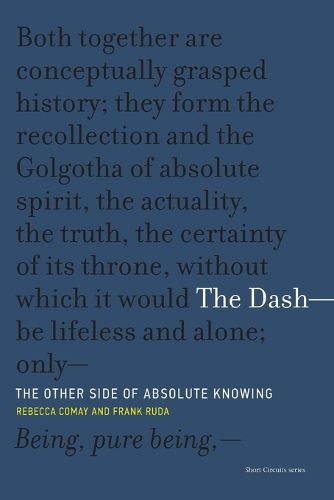Readings Newsletter
Become a Readings Member to make your shopping experience even easier.
Sign in or sign up for free!
You’re not far away from qualifying for FREE standard shipping within Australia
You’ve qualified for FREE standard shipping within Australia
The cart is loading…






An argument that what is usually dismissed as the mystical shell of Hegel’s thought-the concept of absolute knowledge-is actually its most rational kernel. This book sets out from a counterintuitive premise- the mystical shell of Hegel’s system proves to be its most rational kernel. Hegel’s radicalism is located precisely at the point where his thought seems to regress most. Most current readings try to update Hegel’s thought by pruning back his grandiose claims to absolute knowing. Comay and Ruda invert this deflationary gesture by inflating what seems to be most trivial- the absolute is grasped only in the minutiae of its most mundane appearances. Reading Hegel without presupposition, without eliminating anything in advance or making any decision about what is essential and what is inessential, what is living and what is dead, they explore his presentation of the absolute to the letter.The Dash is organized around a pair of seemingly innocuous details. Hegel punctuates strangely. He ends the Phenomenology of Spirit with a dash, and he begins the Science of Logic with a dash. This distinctive punctuation reveals an ambiguity at the heart of absolute knowing. The dash combines hesitation and acceleration. Its orientation is simultaneously retrospective and prospective. It both holds back and propels. It severs and connects. It demurs and insists. It interrupts and prolongs. It generates nonsequiturs and produces explanations. It leads in all directions- continuation, deviation, meaningless termination. This challenges every cliche about the Hegelian dialectic as a machine of uninterrupted teleological progress. The dialectical movement is, rather, structured by intermittency, interruption, hesitation, blockage, abruption, and random, unpredictable change-a rhythm that displays all the vicissitudes of the Freudian drive.
$9.00 standard shipping within Australia
FREE standard shipping within Australia for orders over $100.00
Express & International shipping calculated at checkout
An argument that what is usually dismissed as the mystical shell of Hegel’s thought-the concept of absolute knowledge-is actually its most rational kernel. This book sets out from a counterintuitive premise- the mystical shell of Hegel’s system proves to be its most rational kernel. Hegel’s radicalism is located precisely at the point where his thought seems to regress most. Most current readings try to update Hegel’s thought by pruning back his grandiose claims to absolute knowing. Comay and Ruda invert this deflationary gesture by inflating what seems to be most trivial- the absolute is grasped only in the minutiae of its most mundane appearances. Reading Hegel without presupposition, without eliminating anything in advance or making any decision about what is essential and what is inessential, what is living and what is dead, they explore his presentation of the absolute to the letter.The Dash is organized around a pair of seemingly innocuous details. Hegel punctuates strangely. He ends the Phenomenology of Spirit with a dash, and he begins the Science of Logic with a dash. This distinctive punctuation reveals an ambiguity at the heart of absolute knowing. The dash combines hesitation and acceleration. Its orientation is simultaneously retrospective and prospective. It both holds back and propels. It severs and connects. It demurs and insists. It interrupts and prolongs. It generates nonsequiturs and produces explanations. It leads in all directions- continuation, deviation, meaningless termination. This challenges every cliche about the Hegelian dialectic as a machine of uninterrupted teleological progress. The dialectical movement is, rather, structured by intermittency, interruption, hesitation, blockage, abruption, and random, unpredictable change-a rhythm that displays all the vicissitudes of the Freudian drive.